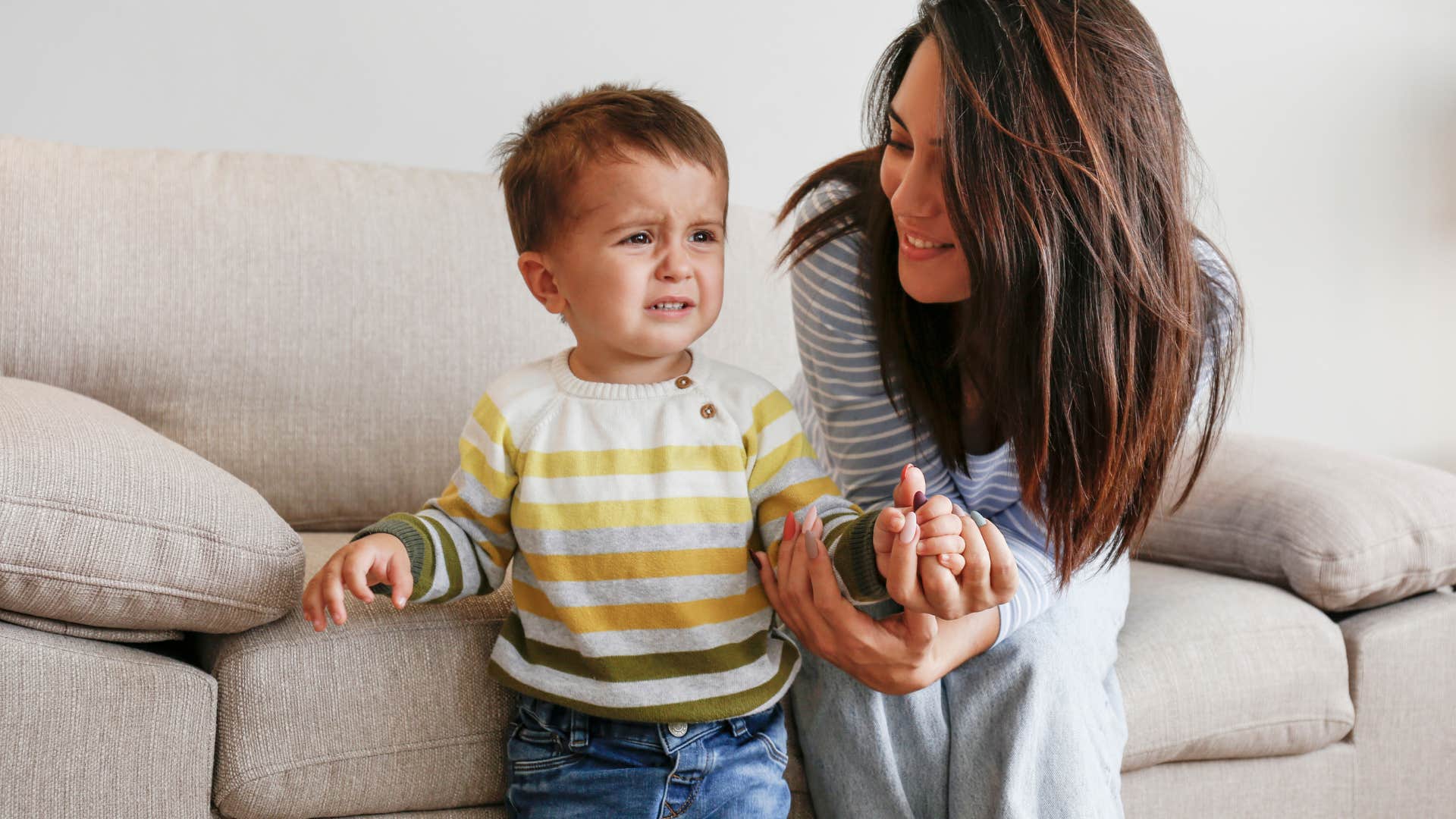People Who Let Their Kids Do These 11 Things Raise Entitled Brats Without Even Realizing
Parents may not even realize they're letting these behaviors slide.
 Nicoleta Ionescu / Shutterstock
Nicoleta Ionescu / Shutterstock As rewarding as parenting can be, it's also an incredibly difficult and demanding job. You're attempting to raise tiny humans into capable adults, and as much as you want to instill specific lessons and behaviors in them, sometimes certain things end up being swept under the rug. Much of the time, parents think they're helping by giving in to their children, but people who let their kids do things that reinforce bad habits and destructive tendencies often raise entitled brats without even realizing it.
Most parents don't actively set out to raise entitled kids, but with the responsibilities of life getting in the way, many think it's best to keep the peace in the household and let things slide. It feels like an easier choice to keep their sanity. The problem with that is that kids don't learn core values. So, the earlier that parents can catch these habits, the easier it will be for their kids to know that life isn't always going to give them what they want.
People who let their kids do these 11 things raise entitled brats without even realizing
1. Get away with whatever they want
 Dikushin Dmitry | Shutterstock
Dikushin Dmitry | Shutterstock
Actually saying "no" can be one of the hardest things for parents to do because they don't want to see their kids upset. For many, it actually just feels way more natural to give in, especially when they have such volatile reactions to hearing that they can't do something. However, the problem with giving in means that children never actually learn the importance of rules. They start assuming that everything should just go their way, and they never really learn the value of patience or how to tolerate being disappointed.
Research has shown that consistent parenting helps create a secure parent-child relationship. That means rewarding and punishing appropriately, being consistent, and essentially not giving in.
Being able to learn how to cope with hearing the word "no" as a child means they'll be able to navigate the complexities and frustrations that life will inevitably throw their way once they're older. Parents who can't learn this end up robbing their children of vital skills, and in turn, raising entitled brats.
2. Accept mediocrity from themselves
 fizkes | Shutterstock
fizkes | Shutterstock
While it's good to give your child praise, especially when they succeed and get something done, there's a major difference between offering support and then just rewarding them for the most mediocre of things. Just because a child has shown up or tried without actually pushing themselves doesn't mean they need to be given some sort of treat.
"Many children win too much or succeed at something too easily. When they lose or struggle, they are often devastated. I’m not saying they shouldn’t be upset; that’s another story. I am saying they shouldn’t let a single loss mean something about them, their character, or their future — at least not permanently," explained licensed psychologist Pamela D. Brown.
By that metric, children will end up thinking that effort doesn't actually matter as long as they're participating. They'll quickly develop this pattern of just getting by, which ends up making it harder for them to take on challenges and pursue their goals. It also means they might end up developing a fear of failure. They think failing is something to be scared of, when in reality, it's something that should be embraced.
3. Not apologize for things they did
 MAYA LAB | Shutterstock
MAYA LAB | Shutterstock
Parents may think that allowing their child to skip out on apologies means they're teaching them not to force sincerity, or because they want to avoid confrontation, but in reality, it ends up doing the complete opposite. While a forced apology can feel hollow, parents end up missing out on teaching their kids that their actions do have consequences, even if they may not feel remorseful about them. They may think that it's perfectly fine to upset, hurt, or even outright disrespect people without taking responsibility for it.
"The best way for your child to learn to apologize is to model for them as you yourself do it. You can apologize to them for losing your temper or being late for pickup. They absorb this without you having to make it a 'teaching point,'" encouraged grief specialist Elena Lister and psychologist Michael Schwartzman.
It's true that sometimes you may say something that you didn't intend to hurt someone else's feelings, and you may not feel sorry for the words you've said, but you feel sorry for the fact that those words caused pain. It's important to recognize that an apology goes a long way, especially if you want to have actual relationships with people as well. No one is going to want to be around someone who can't seem to end a conflict that they themselves started.
4. Skip chores
 Borovskih Olga | Shutterstock
Borovskih Olga | Shutterstock
It might seem harmless at first for you not to have your kids do chores, but not letting them take on those responsibilities means that they're skipping out on learning vital life lessons. What ends up happening is adults who don't know how to do laundry, wash dishes, do their own hair, and take care of other basic household and even personal care tasks.
One study published found that children who participated in more household chores had better working memory and better inhibitory control, which is likely due to their being raised to be well-rounded adults. Chores are something that teach kids basic life skills and even help them practice their own independence in the process. They're a child's first experience with following deadlines and having a routine.
Without the practice of showing up and completing their chores, kids are learning to just let everyone else shoulder the burden instead.
5. Throw tantrums
 evrymmnt | Shutterstock
evrymmnt | Shutterstock
Sometimes, the easiest thing for parents to do is to give in to their kids' tantrums. When they're screaming, throwing themselves on the ground, and just throwing a fit, especially in public, the best option can be to do anything in your power to get them to stop. While it may end up calming the chaos, it doesn't solve anything long-term.
"During tantrums, children typically lash out at their parents with yelling, unkind words, and blame. In this situation, 'leaning in' can perpetuate a child’s dysregulation. It also denies them the opportunity to practice self-soothing and develop emotional regulation skills without relying on parents to 'co-regulate' with them," explained psychologist Paul Sunseri.
When tantrums are essentially rewarded, children aren't learning healthy ways to express their frustration. They miss out on vital opportunities to regulate their emotions and actually problem-solve. As an adult, there will be no one who will solve these issues for them. They have to do it on their own. Learning these coping skills early on will ultimately do a world of good for them down the line.
6. Refuse to share
 fizkes | Shutterstock
fizkes | Shutterstock
Parents may sometimes assume that sharing will eventually come naturally to children, especially when they start attending school and are around more children. So, at home, they may avoid teaching them the need to share, fearing it will end up starting unnecessary conflict, or they may think it isn't something that needs to be taught by them.
But when kids aren't taught to share, they essentially learn not to consider someone else's feelings and to only focus on their own. They may struggle to understand the full extent of how their actions impact others. Considering that life is full of situations where you need to learn to compromise and be understanding, children should be learning the importance of sharing.
7. Avoid tough conversations
 Media_Photos | Shutterstock
Media_Photos | Shutterstock
Parents may want to avoid having conversations with their kids that may veer on the more uncomfortable side. The intention comes from a place of wanting to shield their children from having to think about things that may end up stressing them out, so they simply ignore them or brush them under the rug. But life, especially as an adult, is full of complex moments and situations that require you to really think and be able to engage with other people.
If kids aren't given that chance from a young age, with the guidance of their parents, they often end up avoiding uncomfortable conversations as adults. Whether it's a conversation addressing a mistake or a discussion about a harsh reality of life, there are ways to have those talks with kids and still allow them to walk away with their innocence intact.
8. Lie
 MAYA LAB | Shutterstock
MAYA LAB | Shutterstock
While it's natural for kids to lie, whether out of self-preservation, wanting to spare the feelings of those around them, or wanting to avoid getting into trouble, it's not something that parents should ever ignore. You can tell the difference between a child occasionally saying a little white lie versus just lying about everything and anything.
Either way, when a child sees that they can get away with being dishonest, they miss out on learning to take accountability for the things that they do and say. Children need to understand that lying has consequences, and there's absolutely no way they can build genuine connections and relationships with others if they don't know that lying won't afford them that luxury.
9. Not take responsibility with money
 Ground Picture | Shutterstock
Ground Picture | Shutterstock
Many parents avoid discussing money with their kids because they think it's too complicated a matter to address with them, especially when they're young. There's also the fact that money is considered a taboo topic even amongst adults, which is why we end up having so many financially illiterate people who don't understand the value of the dollar.
Children who aren't learning about the importance of money, how to save, and even how to budget, often struggle to spend their money wisely once they start earning it. Instead, children are just receiving whatever they want without actually having to work, and that sense of entitlement will follow them into adulthood. They might be the types of adults who overspend and live way above their means because it's what they saw from their parents.
10. Never experience boredom
 Iren_Geo | Shutterstock
Iren_Geo | Shutterstock
Parents may think that their children need to be entertained every minute of the day, but that's simply not the case. Rather than learning how to occupy themselves, they depend on their parents to fill their time with whatever they want. In life, there will be moments of absolute boredom, and that's a great opportunity to learn how to fill your time.
Children being left with unstructured time can learn how to think independently and get a bit more creative. They learn the value of patience and aren't just accustomed to their every need being met and catered to. Teaching kids to be comfortable in quiet moments means they will end up being more than capable of creating their own fulfillment as adults, which is always a valuable skill to have.
11. Have unlimited screen-time
 Iuliia Shcherbakova | Shutterstock
Iuliia Shcherbakova | Shutterstock
In the same way that parents may want to avoid having their child sit in excessive amounts of boredom, it means they might end up leaning more toward just thrusting a screen in front of their child's face. While it's impossible to avoid having your child look at a screen, whether they're playing on an iPad or watching TV, there's a difference between parents making that their go-to solution for when they need their child to just sit there and be calm. Research has shown that spending too much time on screens may cause emotional and behavioral problems in children, and those problems can lead to even more screen use down the line.
Children who get excessive screen time lose the ability to be creative and interact with other kids. There was a time when a child would go out to play with their friends in the neighborhood to get their fix of playtime and adventure. Even something as simple as handing them a book and letting them hole up in their rooms is so much better than parking a tablet in their face for hours on end.
Nia Tipton is a staff writer with a bachelor's degree in creative writing and journalism who covers news and lifestyle topics that focus on psychology, relationships, and the human experience.

